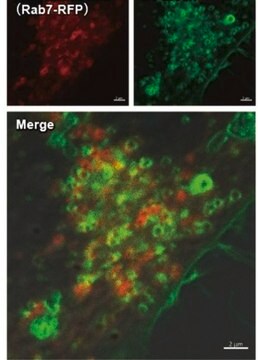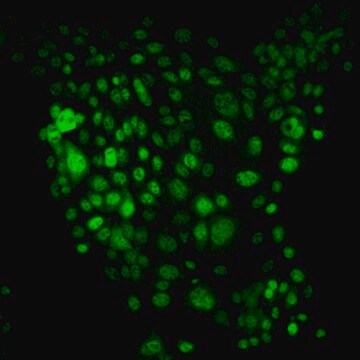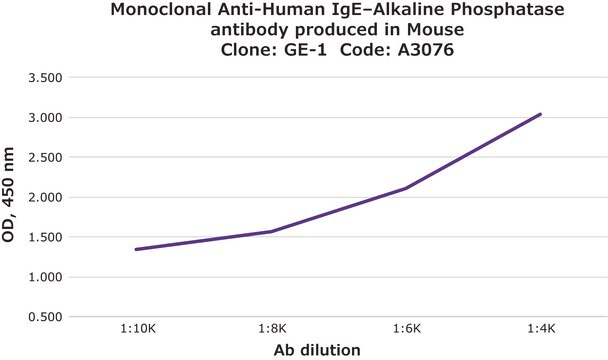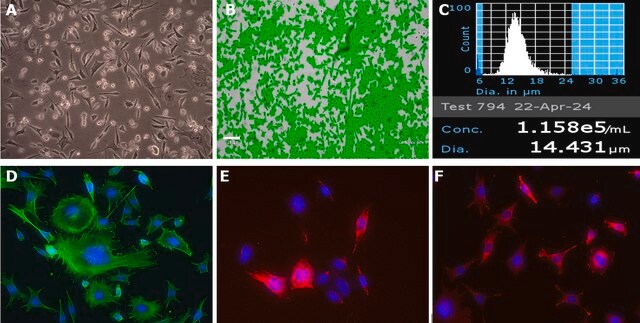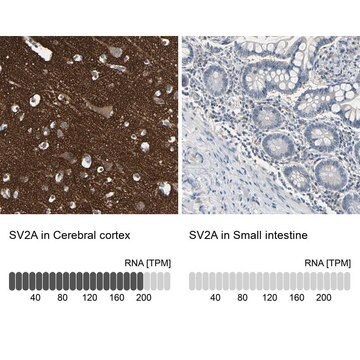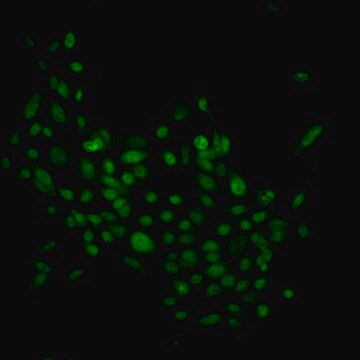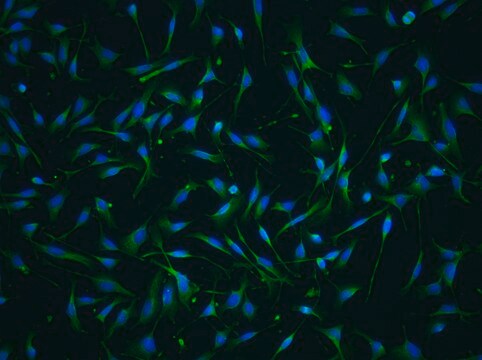SCC624
Lacun.3 Mouse Lung Adenocarcinoma Cell Line

Synonym(s):
Lacun.3 Mouse Lung Adenocarcinoma Cell Line, Lacun-3, Lacun3
Sign Into View Organizational & Contract Pricing
All Photos(1)
About This Item
UNSPSC Code:
41106514
Recommended Products
biological source
mouse
Quality Level
packaging
vial of ≥1X10⁶ vial
manufacturer/tradename
Millipore
technique(s)
cell culture | mammalian: suitable
shipped in
liquid nitrogen
storage temp.
−196°C
Application
- Each vial contains > 1X106 viable cells.
- Cells are tested negative for infectious diseases by a Essential CLEAR Panel by Charles River Animal Diagnostic Services.
- Cells are verified to be of mouse origin and negative for interspecies contamination from human, rat, Chinese hamster, Golden Syrian hamster, and nonhuman primate (NHP) as assessed by a Contamination Clear panel by Charles River Animal Diagnostic Services
- Cells are negative for mycoplasma contamination.
Features and Benefits
Lacun.3 cells are capable of forming spheroids that can be maintained over multiple passages and display increased cancer stem cell characteristics including increased ALDH activity.
Target description
Recent cancer research often studies a newly characterized type of cell referred to as cancer stem cells (CSCs) or also sometimes termed tumor-initiating cells (TICs.) These cells appear to have significant capabilities to grow, differentiate, generate tumors and resist chemotherapy. Tumor sphere cultures (TSCs) have emerged as a new format of studying cancer as well as understanding CSCs. The spheroid structures of TSCs appear to induce stem-like characteristics evidenced by the increased expression of stem cell markers. This 3D spheroid structure is also a much more accurate way to mimic the behavior of a solid tumor which develops in 3-dimensions and behaves quite differently from a monolayer cell culture. Spheroids are understood to have more tumor-forming capabilities when compared to monolayer cultures, yet the underlying mechanism for these characteristics is still under study. Stem-cell like properties, such as increased aldehyde dehydrogenase activity (ALDH), have already been used to identify CSCs in a variety of cancer types.
Storage and Stability
Lacun.3 cells should be stored in liquid nitrogen. The cells can be cultured for at least 10 passages without significantly affecting cell marker expression and function.
Other Notes
This product is intended for sale and sold solely to academic institutions for internal academic research use per the terms of the “Academic Use Agreement” as detailed in the product documentation. For information regarding any other use, please contact licensing@milliporesigma.com.
Disclaimer
Unless otherwise stated in our catalog or other company documentation accompanying the product(s), our products are intended for research use only and are not to be used for any other purpose, which includes but is not limited to, unauthorized commercial uses, in vitro diagnostic uses, ex vivo or in vivo therapeutic uses or any type of consumption or application to humans or animals.
Storage Class
10 - Combustible liquids
wgk_germany
WGK 2
flash_point_f
Not applicable
flash_point_c
Not applicable
Certificates of Analysis (COA)
Search for Certificates of Analysis (COA) by entering the products Lot/Batch Number. Lot and Batch Numbers can be found on a product’s label following the words ‘Lot’ or ‘Batch’.
Already Own This Product?
Find documentation for the products that you have recently purchased in the Document Library.
Our team of scientists has experience in all areas of research including Life Science, Material Science, Chemical Synthesis, Chromatography, Analytical and many others.
Contact Technical Service